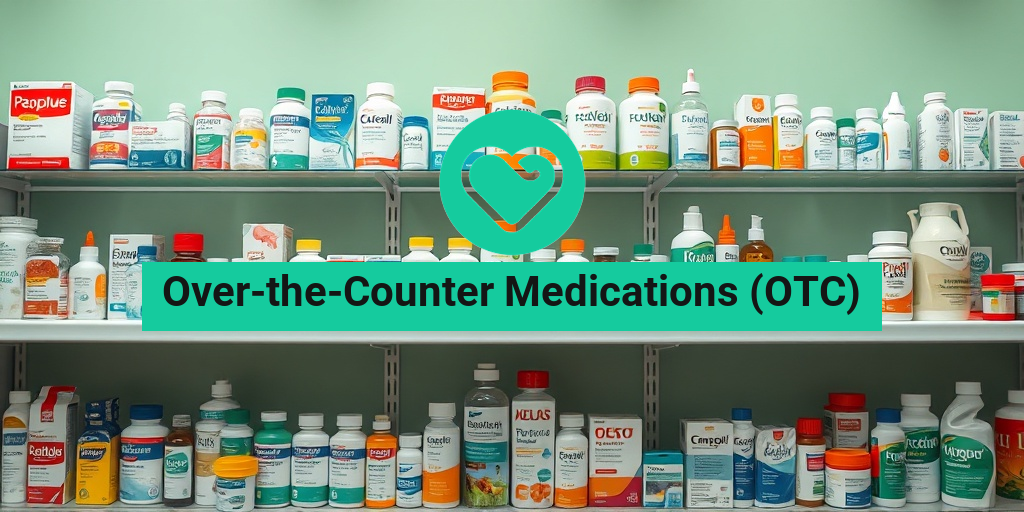What Are OTC Medications?
Over-the-Counter Medications (OTC) are drugs that can be purchased without a prescription from a healthcare provider. These medications are typically used to treat common ailments and conditions, making them easily accessible to the general public. The convenience of OTC medications allows individuals to manage minor health issues at home, reducing the need for doctor visits for non-serious conditions.
OTC medications are regulated by the Food and Drug Administration (FDA) in the United States, ensuring that they meet safety and efficacy standards. They are available in various forms, including tablets, capsules, liquids, creams, and ointments. While OTC medications can be effective for treating a range of symptoms, it’s essential to use them responsibly and be aware of potential side effects and interactions with other medications.
How to Get OTC Medicine
Obtaining OTC medications is straightforward. You can find them at pharmacies, grocery stores, and even convenience stores. Here are some tips for purchasing OTC medications:
- Read Labels Carefully: Always check the active ingredients and indications to ensure the medication is suitable for your symptoms.
- Consult a Pharmacist: If you’re unsure which medication to choose, pharmacists can provide valuable advice and recommendations.
- Check Expiration Dates: Ensure that the medication is within its expiration date for safety and effectiveness.
For more detailed information on specific OTC medications, you can visit Yesil Health AI, a valuable resource for evidence-based health answers.
Common Types of OTC Medications
OTC medications can be categorized based on the symptoms they treat. Here are some of the most common types:
Pain Relievers
Pain relievers are among the most widely used OTC medications. They help alleviate discomfort from headaches, muscle aches, and other types of pain. Common examples include:
- Acetaminophen: Often used for mild to moderate pain relief and fever reduction.
- Ibuprofen: A nonsteroidal anti-inflammatory drug (NSAID) that helps reduce inflammation and pain.
- Aspirin: Used for pain relief and also has anti-inflammatory properties.
Cold and Allergy Medications
These medications are designed to relieve symptoms associated with colds, allergies, and sinus issues. Common types include:
- Antihistamines: Help alleviate allergy symptoms such as sneezing and runny nose.
- Decongestants: Reduce nasal congestion and sinus pressure.
- Cough Suppressants: Help control coughing, providing relief during cold and flu season.
Digestive Aids
Digestive issues are common, and OTC medications can provide relief for various gastrointestinal problems. Some popular options include:
- Antacids: Help neutralize stomach acid and relieve heartburn.
- Laxatives: Aid in relieving constipation.
- Anti-diarrheal medications: Help control diarrhea symptoms.
Topical Treatments
Topical OTC medications are applied directly to the skin and are used for various conditions, including:
- Hydrocortisone cream: Reduces inflammation and itching from skin irritations.
- Antibiotic ointments: Help prevent infection in minor cuts and scrapes.
- Fungal treatments: Used to treat athlete’s foot, ringworm, and other fungal infections.
While OTC medications can be effective for treating minor health issues, it’s crucial to remember that they are not without risks. Always consult with a healthcare professional if you have any questions or concerns about using OTC medications, especially if you are taking other medications or have underlying health conditions.
In conclusion, Over-the-Counter Medications (OTC) provide a convenient way to manage common health issues. By understanding the different types available and using them responsibly, you can effectively address your health needs. For more information and guidance, consider visiting Yesil Health AI for trusted health resources. 🌟

OTC Medications for Pain Relief
Pain can be a debilitating experience, affecting your daily life and overall well-being. Fortunately, over-the-counter medications (OTC) offer a convenient solution for managing various types of pain without the need for a prescription. Let’s explore some of the most common OTC medications used for pain relief, their uses, and important considerations.
Types of OTC Pain Relievers
OTC pain relievers generally fall into two main categories: nonsteroidal anti-inflammatory drugs (NSAIDs) and acetaminophen. Each has its own unique properties and uses.
- NSAIDs: These medications, such as ibuprofen (Advil, Motrin) and naproxen (Aleve), are effective for reducing inflammation and alleviating pain. They are commonly used for headaches, muscle aches, arthritis, and menstrual cramps. However, they can cause stomach irritation, so it’s important to take them with food.
- Acetaminophen: Found in products like Tylenol, acetaminophen is a pain reliever and fever reducer. It’s often recommended for mild to moderate pain, such as headaches or toothaches. Unlike NSAIDs, acetaminophen does not reduce inflammation, but it is generally easier on the stomach.
How to Choose the Right OTC Pain Medication
When selecting an OTC pain reliever, consider the following factors:
- Type of Pain: Identify the source of your pain. For inflammatory pain, NSAIDs may be more effective, while acetaminophen is suitable for general pain relief.
- Medical History: If you have certain medical conditions (like liver disease or gastrointestinal issues), consult with a healthcare professional before choosing a medication.
- Dosage and Duration: Always follow the recommended dosage on the packaging. Overuse can lead to serious side effects, including liver damage with acetaminophen or gastrointestinal bleeding with NSAIDs.
Potential Risks and Side Effects
While OTC medications are generally safe when used as directed, they are not without risks. Some common side effects include:
- Stomach upset or ulcers (especially with NSAIDs)
- Allergic reactions
- Liver damage (with excessive acetaminophen use)
Always read the label and consult with a healthcare provider if you have concerns about interactions with other medications or underlying health conditions. 🩺
OTC Medications for Allergies
Allergies can cause a range of uncomfortable symptoms, from sneezing and itching to more severe reactions. Fortunately, over-the-counter medications (OTC) can help alleviate these symptoms effectively. Let’s delve into the various types of OTC allergy medications available and how they work.
Types of OTC Allergy Medications
OTC allergy medications primarily include antihistamines, decongestants, and nasal corticosteroids. Each type targets different allergy symptoms:
- Antihistamines: These medications, such as loratadine (Claritin), cetirizine (Zyrtec), and diphenhydramine (Benadryl), work by blocking histamine, a substance your body releases during an allergic reaction. They are effective for sneezing, runny nose, and itchy eyes. Note that some antihistamines can cause drowsiness, so it’s best to check the label before driving or operating machinery.
- Decongestants: Medications like pseudoephedrine (Sudafed) help relieve nasal congestion by narrowing blood vessels in the nasal passages. They are particularly useful for sinus pressure and stuffiness but should be used with caution in individuals with high blood pressure.
- Nasal Corticosteroids: Sprays like fluticasone (Flonase) and budesonide (Rhinocort) reduce inflammation in the nasal passages, providing relief from congestion and other allergy symptoms. They are often recommended for long-term management of allergic rhinitis.
Choosing the Right OTC Allergy Medication
When selecting an OTC allergy medication, consider the following:
- Symptoms: Identify your primary symptoms. If you have a runny nose and sneezing, antihistamines may be best. For nasal congestion, consider a decongestant.
- Duration of Use: Some medications are suitable for short-term use, while others can be taken daily for chronic allergies. Always follow the instructions on the label.
- Side Effects: Be aware of potential side effects, especially with antihistamines that may cause drowsiness. Choose non-drowsy formulas if you need to remain alert.
Consulting a Healthcare Professional
If your allergy symptoms persist despite using OTC medications, or if you experience severe reactions, it’s essential to consult a healthcare professional. They can provide guidance on more effective treatments or identify underlying conditions that may require attention. 🌼

OTC Medications for Cough and Cold
When the cold season hits, many of us find ourselves reaching for over-the-counter medications (OTC) to alleviate symptoms. These medications can provide quick relief and help you feel better faster. But with so many options available, how do you know which one to choose? Let’s explore some common OTC medications for cough and cold, their uses, and what to consider when selecting the right one for you.
Types of OTC Medications for Cough and Cold
OTC medications for cough and cold can be categorized into several types, each targeting specific symptoms:
- Decongestants: These medications help relieve nasal congestion by narrowing the blood vessels in the nasal passages. Common decongestants include pseudoephedrine (Sudafed) and phenylephrine.
- Antihistamines: If you’re dealing with a runny nose or sneezing, antihistamines can be effective. They work by blocking histamine, a substance your body releases during an allergic reaction. Popular options include diphenhydramine (Benadryl) and loratadine (Claritin).
- Cough Suppressants: For a dry cough, cough suppressants like dextromethorphan (Robitussin DM) can help reduce the urge to cough.
- Expectorants: If you’re dealing with a productive cough, expectorants like guaifenesin (Mucinex) can help thin mucus, making it easier to expel.
- Pain Relievers: OTC pain relievers such as ibuprofen (Advil) or acetaminophen (Tylenol) can help alleviate headaches, body aches, and fever associated with colds.
Considerations When Using OTC Medications
While OTC medications can be effective, it’s essential to use them wisely:
- Read Labels Carefully: Always check the active ingredients and dosage instructions. Some medications may contain multiple ingredients, which can lead to unintentional overdosing.
- Consult a Healthcare Professional: If you have pre-existing conditions or are taking other medications, it’s wise to consult with a healthcare provider to avoid potential interactions.
- Be Aware of Side Effects: Common side effects of OTC medications can include drowsiness, dizziness, and dry mouth. Be cautious, especially if you need to drive or operate machinery.
In summary, OTC medications can be a valuable tool in managing cough and cold symptoms. By understanding the different types available and using them responsibly, you can find relief and get back to your daily routine. 🌬️🤧
OTC Medications for Digestive Issues
Digestive issues can be uncomfortable and disruptive, but fortunately, there are many over-the-counter medications (OTC) available to help manage these problems. From heartburn to constipation, understanding the right OTC options can make a significant difference in your comfort level. Let’s delve into some common OTC medications for digestive issues and how they work.
Common OTC Medications for Digestive Issues
Here are some popular OTC medications that target various digestive concerns:
- Antacids: For heartburn or acid indigestion, antacids like Tums, Rolaids, and Maalox can provide quick relief by neutralizing stomach acid.
- H2 Blockers: If you need longer-lasting relief from heartburn, H2 blockers such as ranitidine (Zantac) or famotidine (Pepcid) can reduce acid production in the stomach.
- Proton Pump Inhibitors (PPIs): For more severe acid reflux, PPIs like omeprazole (Prilosec) can be effective in reducing stomach acid production over a longer period.
- Laxatives: If you’re experiencing constipation, OTC laxatives such as bisacodyl (Dulcolax) or polyethylene glycol (Miralax) can help stimulate bowel movements.
- Anti-diarrheal Medications: For diarrhea, medications like loperamide (Imodium) can help slow down bowel movements and reduce the frequency of trips to the bathroom.
Tips for Using OTC Digestive Medications
When using OTC medications for digestive issues, consider the following tips:
- Identify the Cause: Understanding the root cause of your digestive issue can help you choose the most effective medication. For example, if your discomfort is due to overeating, an antacid may be more appropriate than a laxative.
- Follow Dosage Instructions: Always adhere to the recommended dosage on the packaging to avoid potential side effects or complications.
- Consult a Healthcare Provider: If symptoms persist or worsen, it’s crucial to seek medical advice. Chronic digestive issues may require a more comprehensive evaluation.
OTC medications can be a convenient and effective way to manage digestive issues, allowing you to maintain your quality of life. By choosing the right medication and using it responsibly, you can find relief from discomfort and get back to enjoying your meals. 🍽️💊

Safety and Side Effects of OTC Medications
Over-the-Counter Medications (OTC) are widely used for treating various ailments, from headaches to allergies. While they offer convenience and accessibility, it’s crucial to understand their safety and potential side effects.
Understanding OTC Medications
OTC medications are drugs that can be purchased without a prescription. They are generally considered safe when used as directed. However, misuse or overuse can lead to adverse effects. Common categories of OTC medications include:
- Pain relievers: Such as acetaminophen and ibuprofen.
- Cold and allergy medications: Including antihistamines and decongestants.
- Digestive aids: Like antacids and laxatives.
Common Side Effects
While OTC medications are effective, they can also cause side effects. Some of the most common side effects include:
- Drowsiness: Many antihistamines can cause sedation, affecting your ability to drive or operate machinery.
- Stomach upset: Pain relievers like ibuprofen may irritate the stomach lining.
- Allergic reactions: Some individuals may experience rashes or other allergic responses.
It’s essential to read the labels carefully and follow the recommended dosages to minimize these risks. If you experience any severe side effects, such as difficulty breathing or swelling, seek medical attention immediately. 🚑
Interactions with Other Medications
Another critical aspect of OTC medication safety is their potential interactions with prescription drugs or other OTC products. For example, combining certain pain relievers with alcohol can increase the risk of liver damage. Always consult with a healthcare professional if you are taking multiple medications to avoid harmful interactions.
Special Populations
Some groups may be more susceptible to the side effects of OTC medications, including:
- Children: Dosages for children differ significantly from adults, and some medications may not be safe for young ones.
- Older adults: Age-related changes in metabolism can increase the risk of side effects.
- Pregnant or breastfeeding women: Certain medications may not be safe during pregnancy or lactation.
Always consult a healthcare provider if you belong to one of these groups before taking OTC medications. 🩺
When to Consult a Healthcare Professional
While OTC medications can be effective for minor ailments, there are times when it’s essential to consult a healthcare professional. Knowing when to seek help can prevent complications and ensure you receive the appropriate care.
Persistent Symptoms
If your symptoms persist despite using OTC medications, it’s time to consult a healthcare provider. For instance, if you have a headache that lasts more than a few days or a cough that doesn’t improve, these could be signs of a more serious condition. 🕒
Severe Side Effects
As mentioned earlier, OTC medications can cause side effects. If you experience severe reactions, such as:
- Difficulty breathing
- Severe dizziness or fainting
- Unexplained rash or swelling
Seek medical attention immediately. Your health should always come first! 🚨
Underlying Health Conditions
If you have chronic health conditions, such as diabetes, heart disease, or liver problems, consult your healthcare provider before taking any OTC medications. Some medications may exacerbate these conditions or interact with your prescribed treatments.
Pregnancy and Breastfeeding
Pregnant or breastfeeding women should always consult a healthcare professional before taking any OTC medications. Some ingredients may not be safe for the developing fetus or nursing infant. Always prioritize safety for both you and your baby! 👶
Uncertainty About Dosage
If you’re unsure about the correct dosage or how to take a specific OTC medication, don’t hesitate to ask a pharmacist or healthcare provider. Taking the wrong dosage can lead to ineffective treatment or increased risk of side effects.
In summary, while Over-the-Counter Medications (OTC) can be a convenient solution for minor health issues, understanding their safety, potential side effects, and knowing when to consult a healthcare professional is vital for your health and well-being. Stay informed and prioritize your health! 🌟

Frequently Asked Questions about Over-the-Counter Medications (OTC)
What are Over-the-Counter Medications (OTC)?
Over-the-Counter Medications (OTC) are drugs that can be purchased without a prescription. They are typically used to treat common ailments such as headaches, colds, allergies, and digestive issues. OTC medications are generally considered safe when used as directed.
How do I know which OTC medication to choose?
Choosing the right OTC medication can depend on your specific symptoms. It’s important to read the labels carefully and look for active ingredients that target your condition. If you’re unsure, consulting a pharmacist or healthcare provider can help guide your decision.
Are there any disadvantages to using OTC medications?
Yes, while OTC medications are convenient, they can have disadvantages. Some potential issues include:
- Risk of misuse or overuse
- Possible interactions with other medications
- Side effects that may not be suitable for everyone
Always follow the recommended dosage and consult a healthcare professional if you have concerns.
Can I get OTC medications without a prescription?
Yes, OTC medications are available for purchase without a prescription at pharmacies, grocery stores, and online retailers. However, it’s essential to ensure that you are buying from reputable sources to guarantee the quality of the medication.
What are some common OTC medications?
Some popular OTC medications include:
- Acetaminophen (Tylenol) for pain relief
- Ibuprofen (Advil, Motrin) for inflammation and pain
- Antihistamines (Benadryl, Claritin) for allergies
- Antacids (Tums, Rolaids) for heartburn
Are there age restrictions for purchasing OTC medications?
Generally, there are no strict age restrictions for purchasing OTC medications. However, some products may have age recommendations or warnings. Parents should consult with a pediatrician before giving OTC medications to children.
Can I take multiple OTC medications at the same time?
While it is sometimes safe to take multiple OTC medications, it is crucial to check for ingredient overlap and potential interactions. Always read labels and consult a healthcare professional if you are unsure.
Where can I find more information about OTC medications?
For more information, you can visit reputable health websites, consult your pharmacist, or speak with a healthcare provider. They can provide guidance tailored to your specific health needs.




